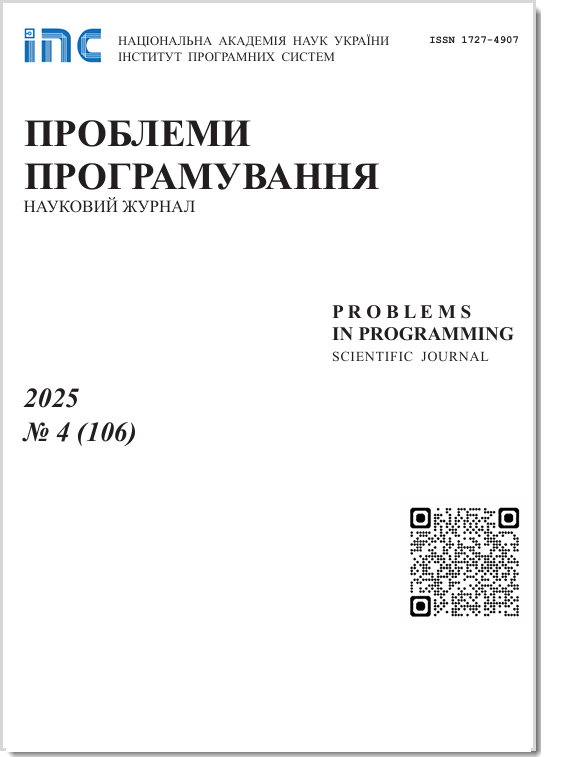Models of concurrent program running in resource constrained environment
Abstract
The paper considers concurrent program modeling using resource constrained automatons. Several software samples are considered:
real time operational systems, video processing including object recognition, neural network inference, common linear systems
solving methods for physical processes modeling. The source code annotating and automatic extraction of program resource constraints with the help of profiling software are considered, this enables the modeling for concurrent software behavior with minimal user assistance.
Problems in programming 2020; 2-3: 149-156
Keywords
Full Text:
PDFReferences
Prusow V.A., Doroshenko A.Yu. Modeling natural and technogenic processes in atmosphere. Kyiv: Naukova dumka, 2006. 541 p.
Ahlem Triki, Jacquez Combaz. (2013) Model-Based implementation of Parallel Real-Time Systems. Verimag Research Report TR-2013-11 CrossRef
Rahozin D. A resource limited parallel program model. Problems in Programming. 2008. N 4. P. 3-10.
Kaynar D., Lynch N., Segala R., Vaandrager F. The Theory of Timed I/O Automata. Morgan&Claypool. 2011. 137 p. CrossRef
Peter Hui and Satish Chikkagoudar. (2012) A formal model for Real-time Parallel computations. In Proc. Of FTSCS-2012. P.39-53. CrossRef
Basu A., Bogza M., Sifakis J. Modeling heterogeneous real-time components in BIP. In SEFM. 2006. P. 3-12. IEEE Computer Society.
Steven S. Muchnick. Advanced Compiler Design and Implementation. Morgan Kaufmann 1997.
Golub G., Van Loan C. Matrix computations. Johns Hopkins University Press, 1996.
Minaee S., Boykov Y., Porikli F., Plaza A., Kehtarnavaz N., Terzopoulos D. Image Segmentation Using Deep Learning: A Survey. arXiv:2001.05566v2
Weidendorfer J. (2008) Sequential Performance Analysis with Callgrind and KCachegrind. In: Resch M., Keller R., Himmler V., Krammer B., Schulz A. (eds) Tools for High Performance Computing. Springer, Berlin, Heidelberg. P. 93-113. CrossRef
Chetlur S., Woolley C., Vandermersch P., Cohen J., Tran J. cuDNN: Efficient Primitives for Deep Learning. Nvidia, 2014. arXiv:1410.0759v3
DOI: https://doi.org/10.15407/pp2020.02-03.149
Refbacks
- There are currently no refbacks.









